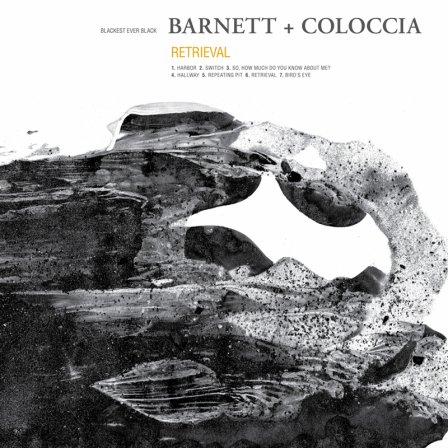The word retrieval implies going out from your present position. Items retrieved may be lost or at a distance, even if that distance is psychic (in the case of memories) or metaphorical (in the case of something broken) — distance from an original purpose. It may involve salvaging something unknown, as from a wreckage, or fetching a known quantity, but in either case, retrieval circumscribes a space that the retriever must cover to reach the completion of the process. In fact, the content-less space that encloses the item-to-be-retrieved is the sole obstacle for the retriever, its unknown quantities the danger that hovers over the process. It is in that space that the item may have lost itself irrevocably, irrecoverably. Retrieval, by Alex Barnett (Oakeater) and Faith Coloccia (Mamiffer), unfolds here, hoping to dislocate the listener into various degrees of lostness while at the same time evoking the texture of place.
Place is an elusive quality in music, and yet it’s also primary for many musicians, particularly those on the outside of typical genre spectra. Experimental musics often aspire to create environments, but the method for doing so is at best unclear. This music is meant to not only fill (or leave empty) space, but to also paint the texture of it. Barnett and Coloccia’s methods here differ greatly from the mimetic methods of, say, The Pastoral Symphony (the 6th), in which Beethoven realistically evokes a thunderstorm and the sounds of a folk dance. On Retrieval, it isn’t field recordings of birds and insects that transport the listener outside; it’s the moods, issuing out of the slow but consistent rhythms, harsh textures, and minor-key melodies. Therefore, the content of the space painted by the duo slips away from easy explanation, since the space’s detail consists only in a blur of emotions and reactions to the sharp attacks of Retrieval’s filter envelopes and slow release of its nebulous, treated vocals.
In this way, Barnett and Coloccia avoid the mimesis of any specific locale, and listeners never find themselves anywhere definite. We are never sure whether the musical space has transformed into a forest or a factory. But it is certain that we have gone somewhere, then somewhere else. The progression of Retrieval is a deepening of this dislocation. Its beginnings, though certainly uneasy, describe a familiar but still strange reality; we can place each individual keystroke of “Harbor’s” almost harpsichord-like synths, until a slowly-building texture unfurls beneath the top layer. But by “So, How Much Do You Know About Me,” the listener confronts a delayed, heartbeat-esque bass thump with horror movie strings. The final piece, though it employs the recognizable static of AM radio, pulls the listener even further (farther) into novel space with its uncertain tonality and rhythm, its grating radio and synthesis, and its haunting vocals.
Texturally, Retrieval features a narrow palette despite the wide range of synthesizers and techniques the duo employed. Perhaps a wise choice, in that the vast variety of all the gear the duo used could become paralytic over their short recording period. But it also entails a kind of limitation on the scope of the transportative qualities of the work; Retrieval doesn’t tour the listener through many, various landscapes, but it does push the listener down a dark but apparent path through a nebulous but affecting space. Thus, we become lost without forgetting that we are there, along this passage. It’s not clear what object or experiences hide in this particular dislocating space. Perhaps the lostness is what we are seeking, and the space itself will become a memory to be retrieved. The going-out would then become a going-in — the retrieval, the lost; and the found quantity, the unknown.
More about: Barnett + Coloccia



